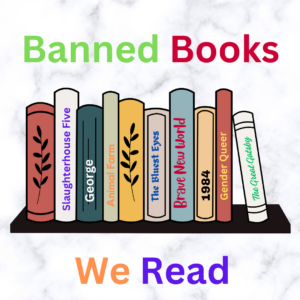 When I was selecting the best mini posters submitted by SEBS students as their library instruction class assignment, the number of banned and challenged books Rutgers students picked took me by great surprise. From classics to recent titles, the books they chose to recommend are available from Rutgers University Libraries; the same titles often listed as the top challenged books by the American Library Association.
When I was selecting the best mini posters submitted by SEBS students as their library instruction class assignment, the number of banned and challenged books Rutgers students picked took me by great surprise. From classics to recent titles, the books they chose to recommend are available from Rutgers University Libraries; the same titles often listed as the top challenged books by the American Library Association.
The reasons behind banning or challenging books vary from time to time. As suggested in a previous post introducing Banned Books Week in 2020, it’s tempting to try and sort banned books into categories based on the grounds for the ban or challenge: indecency or political subversion. (Note: New to banned books? Written by our English literature expert, the post is a great overview of censorship and book bans.)
Classics and bestsellers are regularly challenged. However, thankfully, there’s a lot of awareness about intellectual freedom and censorship all over the world, from ephemeral or grassroots initiatives such as zines to spectacular installations such as the Big Ben lying down with banned books.
Libraries and librarians all over the the United States have been advocating for the freedom to read for decades, while in other, less fortunate regions of the world they are doing their best, along with their readers, to mitigate harsh restrictions imposed by governments and their organizations to make books accessible and available. Historically, banned authors shared entire books in samizdat publications defying censorship and risking arrest and imprisonment.

The display in Chang library relies on ALA resources
When it comes to challenging books, the American Library Association (ALA) is the true champion of advocacy. Graduate students in library schools promptly learn how to face challenges initiated by parents, even if the practice is limited to mostly school libraries and the occasional public library in certain states. Luckily for us, academic institutions don’t require establishing the same protocols, thanks to academic freedom.
- Browse mini-posters of challenged books recommended by SEBS students in 2018-2022.
Library associations in other regions are not always in the position to follow suit, but they should get ready sooner than they think. For example, in Hungary, the new mandate to shrink wrap LGBTQ+ titles in bookstores to prevent minors from getting exposed to their content (in the name of a highly controversial law which is supposed to protect children from harm, or so they say) might reach libraries sooner than we think. Previously, brave librarians had successfully resisted local government demands to remove a book from the shelf in a country where shredding the same title in public was hailed by many.
Library associations can provide guidance to their members with information and suggested procedures, preparing librarians for the unspeakable. Without the strong support they provide through their privileged professional status, librarians may have to resort to mom-and-pop solutions, often risking their jobs. Or, as my Hungarian colleague reminded me, in order to avoid confrontations, libraries simply won’t purchase these books, preventing their users from accessing them.
Let’s observe Banned Books Week together for them too – because we can.
